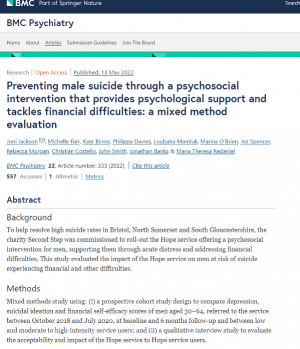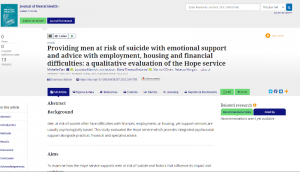Hope: supporting men at risk of suicide in the Bristol area
Rates of death from suicide are higher in the Bristol, North Somerset and South Gloucestershire (BNSSG) area than other parts of England. The Department for Health and Social Care has given funding to the areas most affected by suicide. In BNSSG this was used to expand the Hope project.
Hope addresses the distress created by debt, financial, employment or welfare difficulties. It takes mental health and social circumstances into account and doesn’t just focus on one aspect of a man’s life.
ONS data shows that around three-quarters of all suicides are among men, with the highest rates occurring in middle age, so Hope is aimed at this group. Hope was piloted in 2016 and in 2018 it was rolled out across the BNSSG area. It is run by the mental health charity Second Step.
Men aged 30-64 who went to hospital because they had self-harmed or had been identified as at risk of suicide because of financial difficulties, were referred to Hope. Most referrals were from the hospital mental health crisis and A&E psychiatric liaison teams. Other referrals were self-referrals, or came from agencies such as GPs, mental health crisis and triage teams, other charities and the Job Centre.
The men were offered one-to-one sessions with a Hope worker, who gave help and advice on money problems, as well as mental health and social support.
In the sessions the Hope worker:
- Listened to and supported the men to cope with and manage their suicidal feelings
- Provided a non-judgemental, safe space to share concerns and create a support plan
- Helped the men understand official letters about their state benefits, gave benefits advice and helped them access advice agencies
- Signposted to other community support, including mental health care
The number of sessions depended on what each man needed. Hope workers could also be contacted by phone and text, so men could access support when they needed it, including in times of crisis.
What we did
This study had three parts:
- We used questionnaires to compare how men felt before and after being in the Hope project for six months. The questionnaires focused on depression, suicidal thoughts and whether the men felt in control of their finances
- We interviewed men using Hope, to understand whether it was acceptable to them and the impact it had
- We interviewed Hope staff, advice workers and NHS referral staff, to understand more about how it worked
What we found and what this means
The questionnaires showed around a 50 per cent reduction in both depression and suicidal thoughts after six months of being in the Hope project, compared to when the men first started with Hope. They felt 26 per cent more in control of their finances.
However, the study is relatively small with only 80 men completing the questionnaire after six months. We also weren’t able to compare with men who hadn’t engaged with Hope.
The interviews with 16 men supported the findings from the questionnaires and showed how ‘Hope saved my life’ for several of the men. Most men described being able to move forward and tackle challenges with more confidence.
The role of the Hope workers and their ability to create a non-judgemental and trusting relationship was central to this. This approach helped men to open up and share concerns and suicidal feelings. One man said: “I could tell her anything”.
The Hope workers’ advice and signposting to other support, whilst maintaining an ongoing relationship with the men, were vital.
The staff we interviewed described the impact that the project has had on the men they worked with:
“Actually their internal feelings can be … actually very close to attempting suicide and often I find when they start to share… what comes to the surface quite quickly is that felt quite an instant release, relief, at just being able to say things that sometimes has been going round in their heads for years… it’s like now somebody knows this secret I’ve been carrying all this time and now I’ve got a space to process it.”
Both men and staff said Hope created a space where men felt comfortable and were able to express themselves, free from the social norms and pressures associated with masculinity.
Some staff highlighted how not all mental distress was alleviated by resolving practical problems. Several men talked about things in their past they hadn’t been able to speak about before, including childhood abuse. The Hope workers weren’t trained to treat trauma, so had to refer these men to other services whilst continuing to provide support for other issues.
The questionnaires and interviews show the Hope project offers practical and emotional support to men who have experienced suicidal feelings, redundancy, homelessness and poverty.
Hope occupies an important space between mental health and social care, cutting across the boundaries between psychiatric care and social advice agencies. Our research demonstrates the value of providing an integrated service.
What next?
Our findings have been submitted to the UK Government’s call for evidence to inform their mental health and wellbeing plan.
We hope that this work will help inform other similar services, helping people at their most difficult times.
Papers

Preventing male suicide through a psychosocial intervention that provides psychological support and tackles financial difficulties: a mixed method evaluation
Read the paper
Providing men at risk of suicide with emotional support and advice with employment, housing and financial difficulties: A qualitative evaluation of the Hope service
Read the paperLinks and downloads
- PolicyBristol have produced a policy briefing on our evaluation of Hope Read the policy briefing
Lead collaborators
- Jeremy Spencer, Second Step
